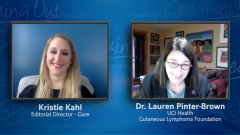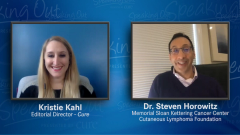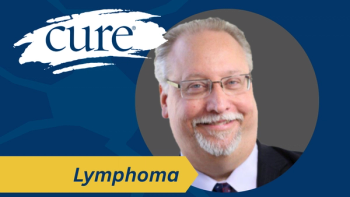
Outside of Treatment
Kristie L. Kahl: Can you explain how quality of life might play a role in a patient with cutaneous lymphoma?
Dr. Lauren Pinter-Brown: That's a really important question. And for one, what's really unusual about cutaneous lymphomas as you can see them. So, it's a cancer that you can actually see. And I think for many people, this side of it might make them self-conscious around other people, and it might in some ways present a barrier to social interactions. In addition, sometimes the lesions itch really bad. And that, of course leads to poor quality of life. It may impair sleeping, it may impair activities of daily life and it's something that we really need to pay attention to in addition to treating the cancer itself.
Kristie L. Kahl: What options are available for skin management of this disease?
Dr. Lauren Pinter-Brown: The most important thing probably is to keep the skin lubricated. Because if the skin is dry, it's going to itch more. The itch is really interesting in this condition, we're used to having itching, say from a bug bite. And that's mediated by something called histamine. We take antihistamines for that itching and cutaneous lymphoma is really mediated in a different way by nerve pathways. So antihistamines aren't so helpful. But some things that people might take for nerve problems might be extremely helpful. So, I know that itching can be an a terribly frustrating problem for patients. And part of it is that when they're treated, they're treated for the itching from bug bites and not from the itching that might be more caused by their lymphoma.
Kristie L. Kahl: What is the impact that it could have on a patient's social life?
Dr. Lauren Pinter-Brown: Well, luckily, (the disease) likes to go where the sun doesn't shine. So mostly, that's people's buttocks and women around their breasts. So, in general, social interactions, people probably wouldn't see them unless somebody is at the beach, but certainly if somebody has a more intimate relationship with someone, this could really be an area that would make someone very self-conscious. And occasionally, the lesions are on people's faces or create problems with their hair, so that would be more visible to the general public.
Kristie L. Kahl: What types of psychosocial issues do we typically see with cutaneous lymphoma?
Dr. Lauren Pinter-Brown: I think, paradoxically, the biggest one is that the majority of patients have early-stage disease. And it probably won't lead to their death. However, they've been given the diagnosis of cancer. And I think that's very, very difficult. Sometimes for people to really view themselves as a healthy person that has a problem that's going to be managed, versus someone that has cancer. In our culture, the word cancer carries a lot of stigma and many people equate a diagnosis of cancer with death, which is really not true. So, I think that's really the one of the biggest problems that I encounter is just the stigma using the word cancer.
Kristie L. Kahl: Sometimes we hear this type of cancer is a “good cancer,” what do we say to something like that?
Dr. Lauren Pinter-Brown: Well, I think they're trying to be reassuring, and what they're trying to say is that it's very manageable, that it probably won't kill them, that there's lots of treatments. And I probably would like to use those words more than using the words “good cancer.” But at the same time, we have to realize that there's people with cutaneous lymphomas that do have very advanced disease, and it really does represent something that is life threatening. So I would shy away a little bit from making it seem like there's nothing that needs to be done or that the person doesn't need follow up.
Kristie L. Kahl: We also talk to patients a lot about fertility and sexual issues that that might be from treatment long term. What are some types of treatment options or discussions we can have for patients to address these issues?
Dr. Lauren Pinter-Brown: There's one issue that comes up all the time. So when we treat cutaneous T-cell lymphoma, we don't often use chemotherapy, that would be the more common situation where I'm discussing fertility of somebody getting chemotherapy. But in cutaneous lymphoma, we use things called retinoids. That means they're like vitamin A, and they cause birth defects. So very frequently, when I'm treating patients that could bear children, we are talking about the fact that if they're going to be taking a drug like that, that if they're female, or their partner can get pregnant. That really is an issue for many younger people. And it's something that we really have to discuss when we're talking about treatment options to make sure that we don't impair the person's plans for life. Because as we talked about, this is something that's usually very manageable and we want the person to have a normal life.
Kristie L. Kahl: Can you talk about how this is turning into more of a chronic type of cancer and what that means for patients?
Dr. Lauren Pinter-Brown: That's the goal for a lot of cancers, to turn them into chronic diseases. So if you want to call it chronic disease, like high blood pressure, diabetes, obviously, there's millions and millions of people walking around in the world that have those disorders, you can't tell from looking at them, mostly they’re having a normal life. And the idea with many cancers is that we don't have the ability to cure to make them go away forever, is just to make them things that are controllable, so the person can have a normal life. And I think that that's very doable for the majority of people that have cutaneous lymphomas.
Kristie L. Kahl: Are there any resources that patients can visit to learn more about issues associated with the disease outside of just their treatment?
Dr. Lauren Pinter-Brown: Well, again, I think the Cutaneous Lymphoma Foundation is a great resource. Certainly, you can go on the website and look at all the different resources that are posted there. Or you can even make a call and someone will speak with you personally about your issue. There's also online communities that the foundation is hosting. So there's really a lot of different ways that people can get reassurance and more information. In addition, there's other patient advocacy groups as well like the Lymphoma Research Foundation, that would have information in a more general sense about lymphomas, or the Leukemia & Lymphoma Society would be another resource.






